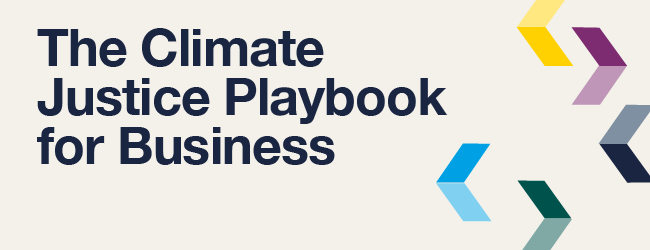B Lab Forces for Good Podcast: How Can Businesses Take on the Climate Crisis?
Developing Tactical Steps and Centering Social Justice for Climate Action
Climate crisis is not a looming threat — it’s already here. Catastrophic extreme weather events are on the rise, and they’re taking a devastating toll around the world. Businesses need to collaborate to find both immediate and long-term solutions to the crisis and advocate for climate justice to reduce the negative impact on the most vulnerable communities globally.
In this episode, we dive into the science-based targets that business leaders should commit to achieving as early as 2030, and share the evidence-based actions and tools to get there.
This episode aims to answer the following questions:
- What role do businesses play as contributors and the solution to the climate crisis?
- What tactical steps can businesses take to be a part of the solution?
- Why should social justice be at the center of climate action?
Guests:
- Kubasu Agapeters, Operations Manager, Fairtrade Africa
- Veena Harbaugh, Director of Sustainability at Sendle
- Brigitta Nemes, Senior Manager of Environmental Standards at B Lab
Listen to the episode now across all major platforms and find excerpts below.

What role do businesses play as contributors and the solution to the climate crisis?
Brigitta Nemes, Senior Manager of Environmental Standards at B Lab: Each company needs to understand their impact to do a thorough analysis of what are the hotspots and and not just looking at their operations, but their entire value chain as well. So up and downstream, do they understand where do they contribute to the greenhouse gas emissions?
Transparency is key. We need to see what does the company disclose about this and, for instance, do they share an analysis of their carbon footprint? Do they know and do they share where the hotspots are in terms of emissions in their entire value chain? Did they make any commitment?
It’s not enough that the company commits to reduce their emissions to what it would call net zero by 2050. But we also want to make sure that there is a short-term or near-term target as well that they are working toward and that they are regularly disclosing their progress. It’s really about prioritizing the shareholders before any other stakeholders, which would also include the planet and future generations as well.
It’s not just about mitigating and reducing emissions, but also helping prepare countries and economies that are already under threat to deal with the climate crisis.

What tactical steps can businesses take to be a part of the solution?
Veena Harbaugh, Director of Sustainability at Sendle: Every day I wake up and get to work on how the company can have the least harm on the planet and the most positive impact for people on the planet. It’s reducing the harm of shipping, leveling the playing field to serve small businesses, and then transforming the shipping industry from kind of a dirty, high-polluting industry to the kind of clean network that our economy needs.
We can’t get to net zero just through our own control. We have to get to net zero by working with partners. We’ve done everything possible within our shipping network to reduce emissions, not just offset them. So what that means in a practical day-to-day basis for me means getting really granular with our emissions calculations to understand, Hey, what’s our starting point here for the emissions? And then figuring out, OK, if our end goal is net zero and by 2030, which is not that far from now, what are the kind of transformative changes that we need to make?
A simple way that you can look at that is on your street. On my street, I see five different trucks come deliver products to people’s doors. And they’re not small, efficient vehicles. They’re these big trucks with gates that can barely turn around. That is just such a clear example of how the shipping industry is still built for a different time. That truck was built for a time where that was going to a warehouse and not being used for delivery to millions of people’s doorsteps.
Businesses can redesign their models so that in operating, we are restoring the ecosystems that we rely on.

Why should social justice be at the center of climate action?
Kubasu Agapeters, Operations Manager, Fairtrade Africa: What we are seeing now for most of the value chains is a decline in productivity because of climate change. We are also seeing producers … abandoning farming altogether because they want to go to look for different opportunities.
How can we support them to ensure that they are overcoming challenges and able to cope with climate change? What we discovered is that Indigenous knowledge and working with producers is very important in climate change prediction. In designing the solutions that can help producers themselves address climate crisis, were able to come up with a guide that defines key steps. The main reason why we need to to have the voices of farmers and workers in these climate change discussions is that you cannot design a solution or you cannot decide for somebody without involving them.
We want to see the involvement of farmers and workers so there is fairness in how the decisions are made and equal access to financial resources for farmers and workers so that they can invest in climate change mitigation and adaptation.
We are saying that climate change is no longer an ecological crisis. Climate change is an economic crisis. Climate changes is a health problem. Because when you look at the whole spectrum of how climate change affects farmers and workers, it cuts across all the spheres.
Listen to the episode now across all major platforms.
A version of this article was originally published at https://www.bcorporation.net The views and opinions expressed are those of the interviewees and do not reflect the positions or opinions of the producers or any affiliated organizations.
B The Change gathers and shares the voices from within the movement of people using business as a force for good and the community of Certified B Corporations. The opinions expressed do not necessarily reflect those of the nonprofit B Lab.


